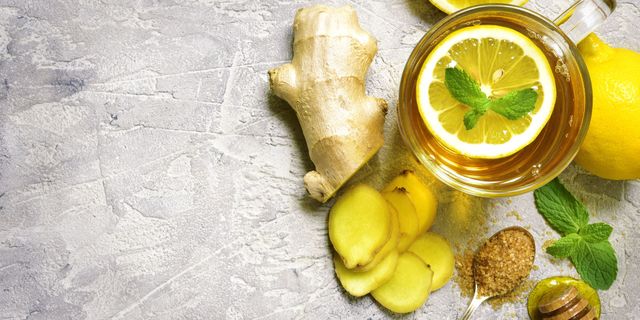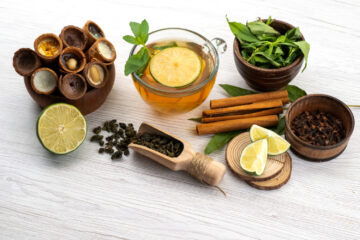Health Benefits of Lemon Ginger Tea

Since then, ginger has been used as a condiment in numerous forms, including fresh, dried, pickled, crystallized, powdered, or ground.
Lemons are well known around the world for their sharp, sour flavor and for being an excellent source of vitamin C and antioxidants. Lemons have been used both as a flavoring and as a main ingredient in many teas.
Together, the sour flavor of lemon and bitter tartness of ginger combine into a tea with a crisp, sharp flavor and with many health benefits.
Health Benefits
Lemon ginger tea offers the following health benefits:
Relief from Nausea
People have used ginger to treat gastrointestinal (stomach-related) complaints since ancient times, and it has been used to give relief for nausea, vomiting, and indigestion. Clinical studies have shown that ginger in its many forms — including lemon ginger tea — is an effective treatment for nausea and vomiting — even resulting from pregnancy and chemotherapy.
Weight Loss
Lemon ginger tea can also help you lose weight. Lemon has been shown to reduce insulin resistance, helping to reduce the amount of fat stored in the body. Ginger has been shown to reduce hunger, which can help people lose weight.
Improved Immunity
Lemon is a rich source of vitamin C and antioxidants, which both have immunity-boosting properties. Ginger also has immunity-boosting properties and can guard against some bacteria.
Protection from Some Cancers
Ginger is believed to reduce the risk of some cancers.
Reduced Risk of Cardiovascular and Liver Disease
Lemon and ginger contain components that are also believed to help reduce risks associated with cardiovascular disease and liver disease.
Pain Relief
Lemon ginger tea can help reduce pain associated with inflammation, arthritis, and even headaches. Some people enjoy drinking a cup of lemon ginger tea to relieve muscle soreness after a good workout, or for relief from menstrual pain.
Nutrition
Lemon and ginger are normally good sources of vitamin C, antioxidants, fiber, vitamin B-6, magnesium, and potassium. However, dehydrating and boiling the ingredients tend to remove these nutrients, leaving only small amounts in the final tea.
Nutrients per Serving
An 8 ounce serving of unsweetened caffeine-free lemon ginger tea contains:
- Calories: 0
- Total Fat: 0 grams
- Sodium: 0 milligrams
- Total Carbohydrates: 0 grams
- Sugars: 0
- Proteins: 0 grams
These amounts may vary by brand. It’s common to add other ingredients such as milk, cream, or a sweetener to lemon ginger tea, and these ingredients may change the tea’s nutritional content.
Possible Side Effects
Both lemon and ginger are recognized by the Food and Drug Administration as “generally safe.” However, ginger can cause some blood thinning, so you should check with your doctor before taking it if you are using medication like warfarin or other blood thinners.
How to Prepare Lemon Ginger Tea
You can find lemon ginger tea at many grocery stores. Most often, you can prepare it from tea bags or from tea mixes. However, if you’d like to get the maximum benefit and flavor, you can prepare your own lemon ginger tea using these fresh ingredients and this method:
- 1-inch length of fresh ginger
- 1 lemon
- 4 cups boiling water
- Slice a 1-inch length of fresh ginger, as finely as you can. Alternatively, you can also grate the ginger.
- Add the ginger to boiling water. Allow it to boil for 20 minutes.
- Slice 1 lemon into fine slices. Reserve a few lemon slices to use as a garnish.
- Add the lemon slices, and allow the mix to simmer for another 5 minutes.
- Strain and drink this tea throughout the day. Garnish each cup with one of the reserved lemon slices. It’s great hot or cold!


















